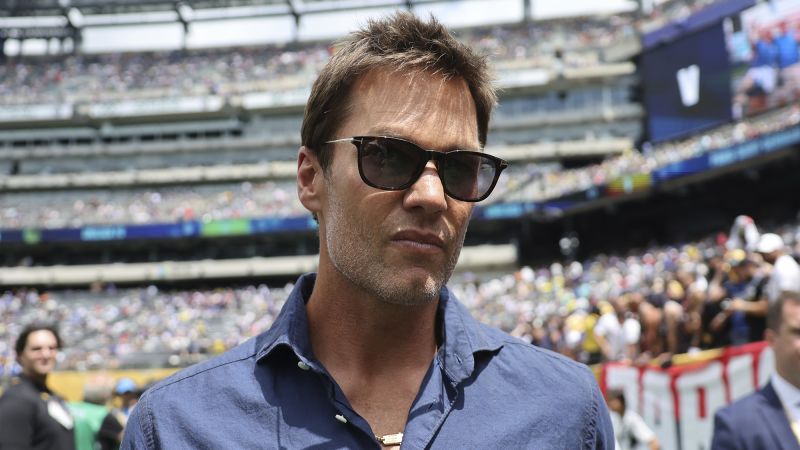NAPA, Calif. — As Ben Griffin stepped away from the cameras and microphones — answering questions about the putt he just missed and the tournament that slipped away — the first man rushing over to greet him was the man who stole it.
Before celebrating his Procore Championship win, Scottie Scheffler wanted to embrace his newest Ryder Cup teammate.
“Good job, brother,” said Scheffler, wrapping his arm around Griffin as they chatted and walked back to their wives. “Keep up the good work.”
“You make everything,” Griffin said back as they playfully exchanged words.
No, the Procore Championship was not some monumental event. Still, everything about a Ryder Cup rookie getting encouragement from the world No. 1 player in Napa Valley two weeks before the event begins is indeed an essential moment for the future of the U.S. team, more than it immediately meets the eye. There’s the mere fact that they are here. There’s the way the team acts together. There is an entire quiet conversation happening beneath the surface of why this all could be different.
It’s because Scottie Scheffler is the top dog in that team room, and the ripple effects of that kind of personality leading the United States are strange to grasp.
“It’s different,” said vice captain Gary Woodland, “to have somebody that’s that good and been that dominant to come in with no ego.”
“I’m so happy we don’t have to play against you in a few weeks” 😂
The feeling is mutual.@ProcoreChamp @RyderCupUSA pic.twitter.com/SNYIB9oxwt
— PGA TOUR (@PGATOUR) September 15, 2025
After decades of Tiger Woods being the biggest force in golf — an obsessed-over attention vacuum who only won one Ryder Cup in eight attempts — people around this crew of Americans are noticing that a down-to-earth phenomenon leading the team might be creating an entirely different vibe for the occasionally individualistic Americans. It’s a culture of leaving your ego at the door.
“The more I’m around Scottie, the more I’m impressed with who he is,” captain Keegan Bradley said. “We all know what a generational talent player Scottie is, but when you see Scottie around our guys, around the rookies, the willingness of him to do literally whatever it takes for us to win the Ryder Cup.
“And when your best player is doing that, you know, the rest of your team is going to fall in line of his lead.”
Scheffler enters this Ryder Cup on the heels of the most dominant two-year run the sport has seen since Woods — 15 wins, three major championships, an Olympic gold, etc. — and this third Ryder Cup feels like an important one for him. Golf careers and their perceptions often run parallel to cup performances, and Scheffler’s rise has been defined by two polar opposite Ryder Cup outings.
He broke onto the scene at Whistling Straits in 2021 as the final man picked, a 25-year-old without a PGA Tour win but who top players vouched for to captain Steve Stricker. In turn, he stole the show by winning 1 1/2 points in foursomes with Bryson DeChambeau before staring down former world No. 1 Jon Rahm in a shocking Sunday singles 4&3 win as the U.S. ran away with the title. By April, Scheffler was a Masters champ and new world No. 1.
But the lasting image of the 2023 European victory may be Scheffler, hunched over on a golf cart, being consoled by his wife, Meredith, as he wiped tears from his face. Scheffler went 0-2-2, including a historic 9&7 defeat (with Brooks Koepka) to Viktor Hovland and Ludvig Aberg on Saturday morning.
Scheffler admitted his ascendance from great to transcendent the past two years may have started with those tears on a golf cart in Rome. “I was fired up and excited to get home and practice and I think my results since then have proven how much work that I put into my game and to get to the point where I am now.”

A record-setting loss in Rome led to one of Scottie Scheffler’s lowest moments as a pro. (Jamie Squire / Getty Images)
However, while Scheffler’s performance in team golf will certainly continue to be scrutinized, the effect being discussed in Napa has more to do with the other 11 players.
See, as Scheffler’s gotten used to all this attention, he’s quietly become better at being a public figure. By last fall’s Presidents Cup in Montreal, captain Jim Furyk (and teammate Bradley) raved about the leadership core in the U.S. room led by top players like Scheffler and Xander Schauffele. This season, he’s become more outspoken on the game’s issues, from being the biggest voice in the player-led push to change the Tour Championship format — a change that actually removed his own advantage as top player — to discussing his support for more robust club testing at major championships. He opened up on how he finds far more meaning in his family than the diminishing returns of victory. He developed his voice.
And throughout this season, Scheffler, along with Schauffele, pushed for changes like last week’s trip to Napa. It is something Bradley pushed for too, but players have repeated how influential Scheffler was in this kind of trip that Europeans have always normalized but Americans tended to reject in favor of a scouting trip to the site.
“It was something that Xander and I had discussed because sometimes we do kind of a prep work trip, but Bethpage was a golf course that most of us knew pretty well,” he said.
“Basically, the conclusion that we came to was it would be nice to have some competition going into the Ryder Cup. And it would be unusual for me to have four or five weeks off before the Masters or the U.S. Open or something like that, so there’s no reason that I should be doing that going into the Ryder Cup.”
Then, there is how Scheffler acts with the players. And it can’t really be understood without first understanding Woods in these very same rooms.
Woods was a supernova, and the reasons for his struggles are so plentiful and nuanced that it’d require its own examination. His teams went 1-7, and Woods himself went 13-21-3 across two decades playing with countless different partners. Maybe the most glaring element of his Ryder Cup reputation is that when Woods missed the 2008 Ryder Cup to injury, the U.S. dominated Europe.
Europe felt like Americans tried to do too much when partnered with Woods, a reason why he ran through 10 partners in his first four Ryder Cups. His fame and aura were also difficult to overcome — “He’s a different kind of dude than the rest of us,” Stewart Cink told the Associated Press in 2008.
Scheffler, no matter what you want to say about him, is a pretty normal dude. To watch him walk a practice round with two Ryder Cup rookies and potential playing partners, J.J. Spaun and Russell Henley, is to see him joke around and talk trash. Spaun spent parts of the day doing video interviews as they walked between holes. So when Spaun cracked a joke about a poor Scheffler drive on the final hole, Scheffler looked up with a dry wit to say, “Oh, are you with us now? You’re done doing TV?”
Woodland keeps going back to how comfortable Scheffler makes people. “Talking to the young guys, asking questions, asking the right questions,” Woodland said. “When it does get quiet, Scottie does speak up. He does say the right things. That helps, right? Because when Scottie talks, everyone listens.”

Scottie Scheffler has won six times in 2025. (Mike Mulholland / Getty Images)
Accurate or not, the U.S. doesn’t have the reputation of being as much of a team — whether it being the Woods (and Phil Mickelson) element, or recent teams being labeled as pampered individuals. Who knows if any of that is actually changing, or even if it needed to, but people around both the last Presidents Cup team and this crew are adamant that this group is tight knit and about the team. Much of that starts with Scheffler.
“I think what’s most impressive about Scottie is just the person that he is,” Bradley said. “When you see the way he plays golf, you’re amazed, but then when you speak to him and you’re around him and you watch him from afar and you watch him with his family and you see his interaction with the younger players and the caddies, you really have — I admire him. I look up to Scottie. I’m not afraid to say that. He does a lot of things right. Shows up on the golf course, shows up in the team room, and obviously he’ll be a big part of our team at Bethpage.”
Perhaps the only thing that annoys Scheffler more than a comparison to Tiger is being the subject of a suggested narrative, so he has no desire to play along with the idea that this is all a conscious leadership decision.
“I don’t really think about it,” Scheffler said. “When guys have questions, they’re willing to ask. You know, Keegan I think is our leader. That’s why he’s the captain and he’s done a really good job.”
It’s just like the fanatical Stilgar’s reaction in “Dune: Part Two” when Paul Atreides adamantly denies he is the messiah they all think he is.
“The Mahdi is too humble to say he is the Mahdi. Even more reason to know he is!”
(Top photo of, left to right, J.J. Spaun, Russell Henley and Scottie Scheffler: Jed Jacobsohn / Getty Images)


